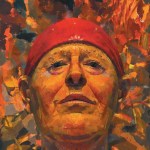
Contributed by Jonathan Stevenson / If poet Pablo Neruda weaponized his talent and his plight to stand against authoritarian forces in his native Chile and elsewhere during his peripatetic exile, the prolific writer Stefan Zweig, a Jew who left Austria in 1934 as Hitler rose to power, was his timorous opposite. Yet there is a kind of sour poignancy in his precious silence about the evils of Nazism, captured very well in Maria Schrader�s Stefan Zweig: Farewell to Europe.
Although sedentary and inordinately talkative, it�s a fine film, blessed by a sharp but nuanced script and acting to match, and beautifully shot. Zweig comes off as a man too civilized for his own good. As World War II raged, he lamented Europe�s tragic embattlement and loss of freedom, but averted his eyes from the collective fate of his fellow Jews and of refugees in general, including his children and ex-wife. His focus seemed myopically and self-pityingly � almost solipsistically � on the disappearance of the rarefied lifestyle of the anointed European writer.
Zweig cloaked his moral abdication in mannered, internationalist pacifism, and the strain of rationalization ultimately seemed to enervate and undo him. Even in his swansong he refrained from stepping up and calling out the culprits of his sorrow. His last words before his death (and his second wife�s) by suicide in 1942 were sterile, disengaged, and conspicuously exculpatory, stating that Europe had merely �destroyed itself� without reference to the fascist instigators. If his suicide was martyrdom, it was hollow in the absence of a designated villain.
Zweig, then, is not a terribly sympathetic character. But he is an ominously resonant one in that he may represent the rule rather than the exception: for every Neruda or Thomas Mann or Walter Benjamin, there are probably multiple Stefan Zweigs. He had taken his artist�s life as having been fully earned, and could only ruminate on the tragedy of its dissolution. Even in exile, he implicitly normalized fascism as but one part of Europe�s collective implosion, and all that finessing and elision left him empty. There�s a very contemporary lesson in that.
Stefan Zweig: Farewell to Europe, screening�at the Lincoln Plaza, UWS, New York, NY.
Related posts:
Art and Film: Pablo Neruda and the triumph of art
Art and Film: War and art�s uneasy survival






















